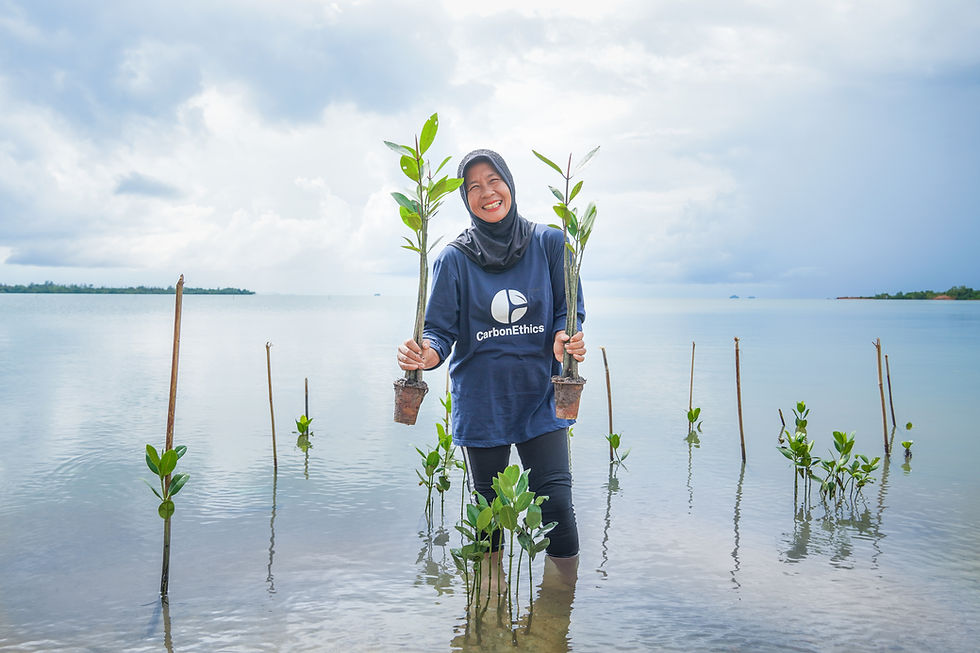Why We Should Give Back to Mother Earth During Ramadan?
- Rizky Phyar Saiputra
- Feb 27, 2024
- 3 min read

Every year, Muslims around the world anticipate the sighting of the new crescent moon that signifies the official first day of Ramadan, the ninth month of the Islamic calendar and the most sacred month in Islamic culture.
Above all else, Ramadan is a time for reflection; Muslims are encouraged to increase their prayers and recitation of the Qur’an during this holy month and be more charitable and kinder to others.
Ramadan also becomes a month to increase gratitude to God for His blessings and provisions. Consequently, Muslims are also encouraged to perform acts of charity and goodness as a form of gratitude to God and nature. Doing good and sharing during Ramadan is a way to draw closer to God and be beneficial to fellow human beings and nature.
During Ramadan, it's paramount to acknowledge the reciprocal relationship between humanity and the environment. Just as we receive sustenance and resources from the Earth, it's imperative to give back to Mother Earth during this sacred time.
Nature has provided abundantly for our livelihoods, offering its resources unconditionally. Therefore, practicing gratitude to God can also be exemplified by protecting and preserving the environment. By being mindful of our ecological impact and taking proactive steps to minimize harm to nature, we honor the blessings bestowed upon us during Ramadan.
This holistic approach to gratitude encompasses not only acts of charity towards fellow humans but also extends to the stewardship of the natural world. Thus, integrating environmental consciousness into our Ramadan practices fosters a deeper connection with both our Creator and the planet He has entrusted to us.
This caring attitude can take the form of simple acts that can be implemented to protect the planet during Ramadan and beyond, such as:
Reduce food waste: During the month of Ramadan and religious holidays, large meals and excessive amounts of food are expected to be prepared during this holy month. To reduce food waste, plan meals in advance and cook only what is needed. If there are leftovers, they can be saved for later or shared with those in need.
Use reusable containers: Plastic water bottles, disposable containers, and plastic bags are significantly polluting the environment. Instead, use reusable containers such as water bottles, cloth bags, and glass containers to transport meals.
An invitation for those who like to share tajil in Ramadan is to replace single-use plastic packaging with one that is environmentally friendly and easy to recycle.
Favor sustainable modes of transportation: Public transportation, biking, or walking are more sustainable alternatives to driving alone. For those who need to travel by car, try carpooling to reduce the carbon footprint.
Reduce energy consumption: Turning off lights when not in use, using LED lights, and favoring natural light help to reduce energy consumption. It is also essential to turn off electrical appliances when they are not in use.
Planting trees is regarded as an act of charity (sadaqa), and the planter receives blessings from all who benefit..
Furthermore, it is an opportunity to strengthen gratitude, care, and compassion between individuals and their God and the environment and the entire creation, emphasizing the importance of stewardship and compassion toward the environment and the natural world. One of the ways we can participate is by joining the #TanamSejutaKebaikan campaign, an environmental initiative during Ramadan that focuses on ecological preservation and empowers local coastal communities and female mangrove farmers.
The #TanamSejutaKebaikan initiative can also be joined by brands that want to make an impact on local communities and participate in biodiversity conservation during this month of goodness. Brands can take several environmental actions to engage with their partners and customers, such as:
Donating a portion of your product's profits for mangrove planting,
Encouraging your customers to participate in donating to mangrove plantations to enhance your brand presence in sustainability,
Opting for sustainable gift experiences to boost meaningful employee engagement and contribution through corporate sustainable gifting.
Additionally, CarbonEthics is open to tailored programs that align with the sustainability goal of each partner. Through #TanamSejutaKebaikan, your business or organization can participate in Ramadhan campaigns that are more meaningful for local communities and the environment. Contact our team to join #TanamSejutaKebaikan.




Kaiser OTC benefits provide members with discounts on over-the-counter medications, vitamins, and health essentials, promoting better health management and cost-effective wellness solutions.
Obituaries near me help you find recent death notices, providing information about funeral services, memorials, and tributes for loved ones in your area.
is traveluro legit? Many users have had mixed experiences with the platform, so it's important to read reviews and verify deals before booking.